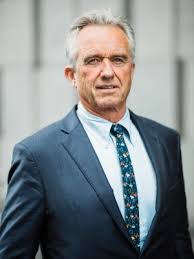This piece was reprinted by OpEd News with permission or license. It may not be reproduced in any form without permission or license from the source.
WASHINGTON, DC, October 20, 2020 Children's Health Defense (CHD), the children's health advocacy group headed by Robert F. Kennedy, Jr., filed its response to the Federal Communications Commission's brief on Monday in the U.S. Court of Appeals for the District of Columbia.
CHD's case against the FCC is challenging the agency's refusal to review its 25-year-old obsolete wireless "health guidelines" and to adopt scientific, biologically-based radio frequency emissions rules that adequately protect public health. CHD is represented by Robert F. Kennedy Jr. and Scott W. McCollough. The brief was filed jointly with Environmental Health Trust.
The response brief is a response to the FCC brief that was filed on September 22nd. CHD's principal brief was filed on August 14, 2020.
The Petitioner's response brief accuses the FCC of failing to "meaningfully assess the vast amount of reliable peer-reviewed scientific and medical evidence generated after 1996 indicating current and potential health risks from exposure at currently-authorized levels" of the radiation emitted by wireless sources such as cell phones, Wi-Fi, cell towers and 5G technologies at levels well below current FCC emission limits.
Petitioners claim that FCC's irresponsible refusal to confront the evidence has resulted in widespread sickness, including in children. The petitioners assert that the FCC's disdain for human suffering reflects a disturbingly distorted view of the public interest.
The FCC guidelines are based on the premise that wireless radiation is not harmful unless it is causing thermal change in tissue. The brief shows that these guidelines are based on obsolete and disproven assumptions which ignore human biology and are promoted by engineers and those with a vested interest in maintaining the status quo.
The brief provided evidence showing that to justify its position, the FCC used unauthorized materials, misconstrued evidence brought by the petitioners, and misrepresented other government agencies' positions.
The brief also claims that the FCC gave "inappropriate weight to unreliable and conflicted views and opinions by industry-supported sources" such as the International Commission for Non-Ionizing Radiation Protection (ICNIRP) and the inter-related World Health Organization's EMF Project. The brief quoted decisions from Italy, one by the Italian Supreme Court that found a causal link between cell phones and brain tumors, and a 2020 Appellate Court decision which stated that experts with ICNIRP affiliations "lacked credibility and authority, and as such, were essentially outside the scientific community." The brief argues that organizations like ICNIRP may be "influential" but represent a minority view.
The scientific consensus is different than the one represented by the FCC. The evidence in the brief shows that the majority of experts, as represented by the BioInitiative working group and its report and by the EMF Scientist's Appeal, agree that the radiation emitted by wireless sources was proven to harm humans and the environment.
The brief claims that the FCC and the FDA's dismissal of the National Toxicology Program (NTP) study is indefensible. The NTP's FDA-funded $30 million study found clear evidence of cancer and DNA damage. The FDA opinion that the results cannot be extrapolated to humans is contrary to the FDA's own protocols and was rejected by numerous experts. The World Health Organization's IARC already classified wireless radiation as a "possible" (2B) carcinogen in 2011. Scientists argue that the NTP and the Ramazzini Institute study, another large-scale animal study, provide the "missing link" needed to classify wireless radiation as a human carcinogen. Courts, including Italy's Supreme Court, already determined that cell phones can cause brain tumors.
The former head of the National Institute of Environmental and Health Sciences (NIEHS), Dr. Linda Birnbaum, supports the case. In a statement that was included in an Amicus Brief, she refuted the FDA and the FCC's position and stated that "overall, the NTP findings demonstrate the potential for RFR to cause cancer in humans." The National Resources Defense Council (NRDC) also filed an Amicus Brief in support of the petitioners.
The brief concludes by accusing the FCC of "obstinacy" and "willful blindness." The brief further strengthens CHD's claims that the FCC's decision is capricious, arbitrary, not evidence-based and an abuse of discretion as defined under the Administrative Procedures Act.
"Children's Health Defense is committed to protecting children from toxic exposures. The FCC's brief provides further evidence that it is a captured agency that puts the interests of telecom ahead of the health of children," said Robert F. Kennedy, Jr., Chairman and Chief Legal Counsel at Children's Health Defense. "We are committed to making our government accountable, and giving a voice to injured children, their parents, their doctors, and the scientists who have spoken out for justice on this issue."
In response to the FCC's denial of "Radiation Sickness" Dafna Tachover, CHD's director of its 5G and Wireless Harms Project said, "The FCC failed to address early signs of a problem, and now the sickness is widespread. Nevertheless, the FCC continues to perpetuate alleged uncertainty and marginalize those who have been injured. There is no uncertainty. The situation of those who have been injured, including children, is desperate especially with the unprecedented deployment of 5G. We hope this case will give visibility to an invisible problem."
"In my 50 years working in public health, I've seen numerous public health failures," said Prof. David Carpenter, MD, Director of the Institute for Health and Environment at the University of Albany and a Petitioner in the case. "Many are a result of government agencies' reliance on industry-friendly science committees. The failure to protect the public health from wireless radiation is, in my opinion, the worst failure." Carpenter is also the co-editor of the BioInitiative Report, the most extensive review of the science on wireless health impacts written by 29 of the world's leading scientists.
(Note: You can view every article as one long page if you sign up as an Advocate Member, or higher).





